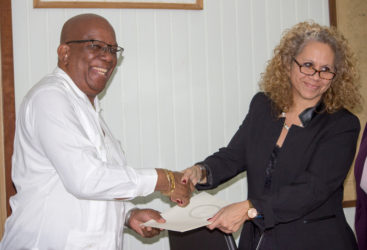An urgent revamping of the Guyana Revenue Authority (GRA) is needed to make it fit for the collecting of taxes and broadening the taxpayers’ base, according to Minister of Finance, Winston Jordan.
On Monday he listed this as one of the objectives of a US$745,000 technical co-operation (TC) agreement clinched with the Inter-American Development Bank (IDB). Two other TCs were signed. The total package was valued at US$1.7m.
According to the text of his remarks at the event released by the Ministry of Finance, Jordan said that the Fiscal Management Modernisation in Guyana Project will funnel US$745,000 towards the modernisation of Guyana’s revenue management and real property tax assessment systems.
“The existing organisational arrangement of the GRA leaves many questions unanswered regarding its capacity and capability to administer and collect the country’s taxes. There is, therefore, urgent need to revamp and re-engineer the operations of that Agency to make it Fit-For–Purpose for the important task of collecting existing taxes while expanding its mandate to widen the tax base so that all are equitably committed to meeting their obligations under the laws of Guyana. It is unwholesome that the few that pay taxes are burdened with their tax obligations while there are large subsectors that have either escaped the tax net, sheltered under deceptive legal provisions or have deliberately (flouted) the tax laws with impunity”, Jordan declared.

The TC, Jordan said, will assist the Government to establish a modern and effective revenue administration. A diagnostic assessment of the current organisational structure and technical capacity of the GRA will be done to identify areas for improvements to the systems. A strategic plan will then be developed.
This TC is also aimed at transforming the valuation system for properties throughout the country.
It will facilitate an urgent assessment of the real property tax collection process under the Valuation Division of the Ministry of Finance.
“We are aware that the current property valuations for our 9 municipalities and 66 NDCs are immensely outdated. This has led to serious deficiencies in the property assessments and hence the commensurate rates and taxes due and payable to these entities.
As Government pursues its national development agenda, the net result to property owners is the improvement to their real estate and the value of that real estate. However, the absence of recent and updated valuations has led to lower-than-expected rates and taxes. This serves to stymie development of the Municipalities and the NDCs. The mandated Property Assessment List of the Valuation Division remains unchanged for many years, even in the face of economic development, and the expansion of communities, municipalities and townships. The current Value List and assessment methods employed by the Division are outdated and unable to reflect the changes in market values of properties”, Jordan said.
To correct this shortcoming, Jordan stated that the Valuation Division needs a modernised system which estimates property values uniformly, at current market value, and in a cost-effective way and this will be facilitated under the TC.
Signed in the absence of the media, the TC on housing will see the creation of a comprehensive strategy for the development of the sector. Jordan said that in the past, housing development efforts were geared towards housing sites; civil works, including roads and drains; and the assigning of house lots. However, he said while progress was made in so far as thousands of persons being able to own their own homes, the policy failed to make a substantial dent in the housing deficit facing the nation. He added that many housing schemes have remained under-developed, under-serviced and sparsely-populated and this has contributed to low occupancy rates.
“The Government currently has over 20,000 house lot applications on file, and this number is growing daily. Evidently, there is a dire need to house the nation rather than merely provide house lots. It is against this background that the Government has embarked on an intensive endeavour aimed at creating a new and innovative housing stock. This Technical Assistance will support Government’s intention to sharply increase the availability of houses, in the most cost effective manner, and to create a more people friendly and efficient mechanism for delivering a comprehensive housing strategy”, Jordan said. The TC in the housing sector is worth US$517,250.
The key beneficiary is the Central Housing and Planning Authority whose institutional capacity will be strengthened at the end of the project.
The third TC will see assistance for a National Aviation Master Plan for Guyana Project which will provide the country with a National Air Transport Plan, a National Airspace Plan, a National Airports Plan, and a National Plan for Administration of Civil Aviation.
“Increasing competitiveness and connectivity is critical for Guyana’s economic growth and development. Deficiencies in our port infrastructure, capacity and legislative framework, add unnecessary costs to the value chain that impact negatively on the country’s competitiveness”, Jordan said.
He added that the Government’s prime concern is to achieve compliance with its obligations as a member of the International Civil Aviation Organisation. The Finance Minister stated that the Loss of Category I status has had a significant impact on the ability of airlines to provide service from Guyana to the United States.
The TC for this project is worth US$500,000.





